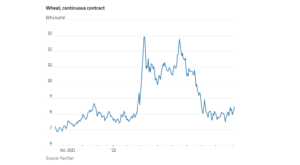China has bought about 12 million metric tons of U.S. soybeans, fulfilling a U.S.-stated pledge to purchase that volume by the end of February, three traders told Reuters on Tuesday,…
Russia Questions Black Sea Export Deal- Implying West Not Fulfilling Obligations to Facilitate Moscow’s Exports
Reuters writer Michelle Nichols reported yesterday that, “Russia on Tuesday questioned a U.N.-brokered deal with Ukraine to boost grain and fertilizer exports by both countries, accusing Western states of failing to honor pledges to help facilitate Moscow’s shipments.”
Nichols explained that, “The United Nations, aided by Turkey, brokered a landmark July 22 deal between Russia and Ukraine that has restarted Kyiv’s Black Sea exports of grain and fertilizer.
“But a key part of the deal was to also facilitate Russian food and fertilizer exports. The United States and others worked to reassure banks, shipping and insurance companies that such transactions were allowed and that Russian food and fertilizer has never been subjected to sanctions.
‘Our Western colleagues are not doing what we were promised by the U.N. Secretary-General,’ Russia’s Foreign Minister Sergei Lavrov said on Tuesday. ‘They are not taking decisions to remove the logistic sanctions that prevent the free access of Russian grain and fertilisers to world markets.’
Yesterday’s article added that, “Russia’s U.N. Ambassador Vassily Nebenzia said later on Tuesday that the 120 day deal that Russia agreed with Ukraine, Turkey and the United Nations ‘normally should be extended.’
“But when asked if it could fall apart, he said: ‘Given the results – or rather no results – I do not exclude anything, but that’s not for me to decide.'”
A separate Reuters article from today reported that, “Russian President Vladimir Putin on Wednesday warned of a looming global food crisis and said he would discuss amending a landmark grain deal with Ukraine to limit the countries that can receive cargo shipments.”
“Putin said only two of 87 ships, carrying 60,000 tonnes of products, went to poor countries, as he accused the West of acting as colonial states,” the article said.
Threats and fakes are typical for Russian politics. During the #BlackSeaGrainInitiative : Asia - 54 vessels for 1.044M tons;
— Oleksandr Kubrakov (@OlKubrakov) September 7, 2022
Africa - 16 vessels for 0.469M tons; Europe - 32 vessels for 0.853M tons pic.twitter.com/s1hPoh9zbT
The Reuters article also pointed out that, “Putin said he would look at ‘limiting the destinations for grain and other food exports‘ and would discuss the idea with Turkey’s President Tayyip Erdogan, who helped broker the deal to unlock exports from Ukraine’s southern ports in July.
“Several top Russian officials, including Foreign Minister Sergei Lavrov, have said over the last 24 hours that Moscow is not happy with the terms of the deal and that the West is not fulfilling its obligations.”
Also today, Reuters writer Pavel Polityuk reported that, “A Ukrainian presidential adviser said on Wednesday that Russia had no grounds to review the landmark deal allowing Ukraine to export grain from ports in the Black Sea and that the terms of the wartime agreement were being strictly observed.”
Separately, Polityuk reported today at Reuters that, “Russia has not taken any steps to change a U.N.-brokered deal to facilitate grain exports, Ukraine’s agriculture minister said on Tuesday after Russian President Putin suggested routes should be changed.”
Meanwhile, Yusuf Khan reported today at The Wall Street Journal Online that, “Wheat prices are up, after Russian President Vladimir Putin threatened to curtail grain exports from Ukraine.

“Benchmark wheat futures in Chicago were recently up 4.2% at $8.51 a bushel, the highest since July 11. Mr. Putin said that Western nations had been keeping grain for themselves, rather than it going to developing nations.”
Elsewhere, Bloomberg News writer Aine Quinn reported yesterday that, “Some of Russia’s top grain exporters are losing their market share as buyers shun state-backed firms, giving overseas traders like Louis Dreyfus Co. the chance to grab more business.

“Demetra Trading and OZK JSC, which is also known as United Grain Co., were among the five largest shippers by this time last year. But they’ve slid out of the top 10 in the first two months of this season, Bloomberg calculations based on ship data from Logistic OS show.
“It’s another sign of how self-sanctioning is affecting Russia’s commodities industry. While sanctions over its invasion of Ukraine haven’t targeted trade in food and fertilizers, there have been logistical and financial constraints. Some buyers, insurers and shippers are wary of falling foul of any penalties by doing business with Russian firms — particularly those linked to sanctioned entities.”





